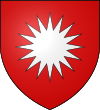Francis of Baux
Francis of Baux | |
|---|---|
| Duke of Andria | |
| Coat of arms |  |
| Born | c.1330 |
| Died | 23 April 1422 |
| Noble family | House of Baux |
| Spouse(s) | Luisa de San Severino Margaret of Taranto Sueva Orsini |
| Issue | James of Baux, Prince of Taranto and Achaea Antonia of Baux, Queen of Sicily Margaret of Baux, Countess of Saint-Pol |
| Father | Bertrand III of Baux |
| Mother | Marguerite d'Aulnay |
Francis of Baux (Template:Lang-fr, Template:Lang-it; c.1330[1] – 23 April 1422) was the first Duke of Andria, Count of Montescaglioso and Squillace, and Lord of Berre, Mison, and Tiano. He was the son of Bertrand III of Baux, Count of Andria and Montescaglioso and his second wife, Marguerite d'Aulnay.[1] Francis's father was a Senator of Rome, Captain General of Tuscany, and Justiciar of Naples.[1] The half-royal Baux family was one of the greatest families of the kingdom after the Duke's marriage to Marguerite of Taranto in 1348.[2]
In 1349, Francis was given an extensive grant by Louis, Prince of Taranto. Prince Louis had married Joanna I of Naples in 1346 as her second husband, and had become King of Naples; he was crowned in 1352/53. The King was brother to Francis's second wife, Margaret, whom he had married in 1348.[1][3] Francis was created Duke of Andria and was the first magnate to be raised to ducal dignity in the kingdom.[2] Andria had been a royal fief which the Duke's father received from Beatrice of Anjou, by virtue of her dower.[4]
On the death of Philip II, Prince of Taranto in 1373, Marguerite and Francis claimed Taranto and Philip's Greek lands (chiefly the Principality of Achaea and its dependent territories) and titles for themselves and their son, James of Baux, as the last male descendant of Philip I, Prince of Taranto.[2] Margaret's claim was supported by Pope Gregory XI.[2] Queen Joanna, however, decided to exercise direct rule over the Prince of Taranto's Greek possessions.[2] In April 1374, Queen Joanna decided to suppress the family and stripped Francis of all his lands and titles.[2] This action led to a civil war between the Queen and the Baux family.[2] An account is recorded in the Aragonese version of the Chronicle of the Morea.[2]
Family
Francis married three times.[1] In 1337, he married firstly to Luisa de San Severino, daughter of Tamasso III de San Severino, Count of Marsico; they had no issue.[1]
In 1348, Francis married secondly to Margaret of Taranto, daughter of Philip I, Prince of Taranto by his second wife, Catherine of Valois, titular Latin Empress of Constantinople.[1] She died about September 1380 in imprisonment.[1] They had two children:
- James of Baux, Prince of Achaea and the last titular Latin Emperor of Constantinople.[1]
- Antonia of Baux, queen consort to Frederick III, King of Sicily.[1]
In 1381, Francis married thirdly to Sueva Orsini, by whom he had issue including Margaret of Baux; mother of Jacquetta of Luxembourg.[1] Through Margaret, Francis was a great-grandfather of queen consort Elizabeth Woodville, wife of King Edward IV of England.[1]
References
- ^ a b c d e f g h i j k l Douglas Richardson. Plantagenet Ancestry: Plantagenet Ancestry: A Study In Colonial And Medieval Families, 2nd Edition, 2011. pg 401.
- ^ a b c d e f g h Kenneth Meyer Setton. A History of the Crusades: Fourteenth and fifteenth centuries, edited by Harry W. Hazard. Univ of Wisconsin Press, 1969. pg 142-46.
- ^ Pietro Giannone. The civil history of the Kingdom of Naples, Volume 2, London, 1723. pg 241.
- ^ Welbore St. Clair Baddeley. Robert the Wise and His Heirs, 1278-1352, W. Heinemann, 1897. pg 463.
